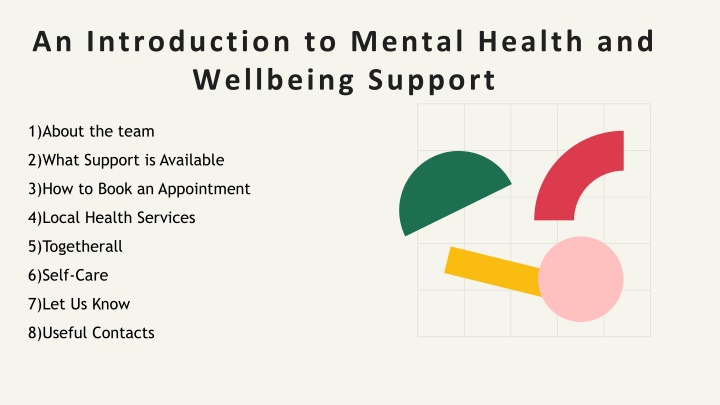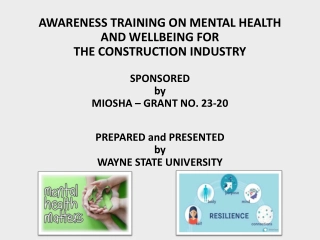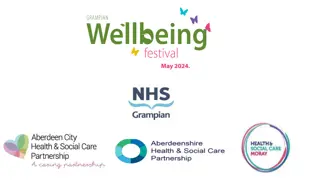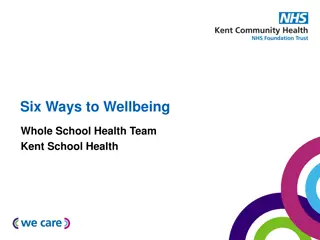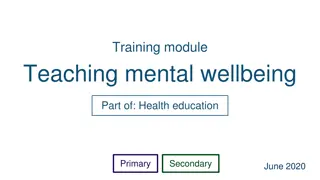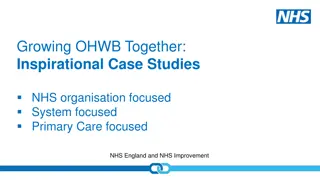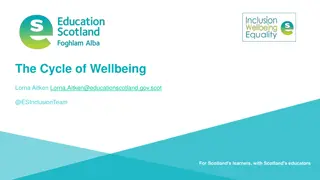Mental Health and Wellbeing Support Overview
The Mental Health and Wellbeing Team at Edge Hill University provides support through various means, including face-to-face appointments, therapy services, and access to local health services. Students can also utilize resources like Togetherall for 24/7 mental health support.
Download Presentation

Please find below an Image/Link to download the presentation.
The content on the website is provided AS IS for your information and personal use only. It may not be sold, licensed, or shared on other websites without obtaining consent from the author.If you encounter any issues during the download, it is possible that the publisher has removed the file from their server.
You are allowed to download the files provided on this website for personal or commercial use, subject to the condition that they are used lawfully. All files are the property of their respective owners.
The content on the website is provided AS IS for your information and personal use only. It may not be sold, licensed, or shared on other websites without obtaining consent from the author.
E N D
Presentation Transcript
An Introduction to Mental Health and Wellbeing Support 1)About the team 2)What Support is Available 3)How to Book an Appointment 4)Local Health Services 5)Togetherall 6)Self-Care 7)Let Us Know 8)Useful Contacts
The Mental Health and Wellbeing Team The Mental Health and Wellbeing Team is here to support you with all of your health and wellbeing needs throughout your time at Edge Hill. We are based in the Catalyst building and in Milton House on campus and offer a range of face to face, telephone and video support. We also offer face to face appointments at our St James campus in Manchester . We are here to offer emotional and practical support and can also help you access other services that may be relevant to you, such as counselling, other Student Services teams and external services.
We can: The Wellbeing team can offer advice and guidance for your mental health and wellbeing, including if you are: Work with you to consider how you can improve your wellbeing whilst at university. Struggling with low mood or feeling anxious. Discuss support options available to you to create a bespoke plan of support suitable for your needs. Feeling thar your mental health is impacting your day to day life. This may include support from within the University and externally. Worried about your mental health. The team can provide 1:1 support, workshops and group sessions and refer you to services such as our in-house therapy services and/or specialist local organisations. Worried about someone else s mental health.
Wellbeing Support Available: Follow on Wellbeing Appointments 50 minute 1 : 1appointment to explore topics such as anxiety, low mood, perfectionism, procrastination etc. Therapy Services Initial Assessment Initial Assessments are 30 minute assessments to discuss what you are struggling with and how we can support you. Telephone, video and face to face appointments available. Following an initial appointment you may be offered a referral for our in-house therapy services. We offer Counselling and Cognitive Behavioural Therapy skills sessions, and you would be offered up to 6 sessions of each per academic year. This may be offered following an initial appointment and are available via phone, video or face to face. Email mentalhealthandwellbeing@edgehill.ac.uk to book or enquire
Health Services If you re moving away from home to live closer to university, we strongly encourage you to register with a GP service close to where you live as soon as possible. Beacon Primary Care is Edge Hill University s nominated practice and has a local site situated on Railway Road in Ormskirk. To register click here. For information about local health services click here or visit 'NHS Services' at www.nhs.uk
All Edge Hill students have free access to 'Togetherall' - an online community which can help to support your mental health 24/7. With creative tools to express how you're feeling as well as a wide range of self- guided courses to do at your own pace, there is plenty of support available. Visit togetherall.com for more info and to sign up.
Self-Care Why do we need to practice self-care? Our well-being is important no matter the circumstance or state of the world. Self-care helps us manage stress better and allows us to be more productive. Taking care of ourselves helps us keep a good work-life balance. Ensure it is part of your daily routine. Set a routine. Schedule time for university/work/classes, as well as time for other roles/responsibilities that you hold Take short breaks during the day. Grab a drink and eat some nourishing food. Take the time to go offline and do other things not related to University/work 7 Exercise if you are able to. This could just mean going for a walk, doing some stretches, gardening, walking the dog, or putting on some music and dancing Practice mindfulness and take time for mentally-relaxing activities as well as activities that stimulate your creativity Go outside. Cloud watch, take in your surroundings, be present in the moment
Worried about someone? You can make an anonymous online referral if you are concerned about another student The Wellbeing Team will contact the person to check they are ok and will provide support if they want it For more information and to make a referral, go to the Wellbeing webpage on the EHU website: ehu.ac.uk/letusknow
Useful Contacts SHOUT Samaritans Hub of Hope 24/7 text based crisis support: text 85258 BSL support: text DEAF to 85258 24/7 crisis support: call 1 1 6 1 23 Find local Mental Health support in your area Mental Health and Wellbeing Team Email: mentalhealthandwellbeing@edgehill.ac.uk Catalyst Helpdesk Campus Support Email: catalystenquiries@edgehill.ac.uk 24/7 first aid and emergency support and out of hours wellbeing support on campus: call 01695 584 227 or text 07785 928911. In an EMERGENCY call 01695 657 585 or 2222 from an internal phone.
Any questions? If you have any questions or want arrange an appointment, please email us at: mentalhealthandwellbeing@edgehill.ac.uk
